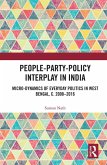Social policy is a subject that helps develop our understanding of the meaning of human wellbeing, and of the systems by which wellbeing must be promoted. As a discipline, social policy has traditionally been blunted by a focus on the nation state; however, in this age of globalisation the most pressing challenges - such as climate change, ageing populations and flagging economies - serve as proof that, even at national level, social policy is now more heavily influenced by global factors than ever before.
In this important and authoritative text, Kepa Artaraz and Michael Hill provide a richly detailed contribution to our understanding of the global forces shaping social problems today. Part One discusses the different approaches to social policy and explores the process of globalisation, looking particularly at its winners and losers and the implications it has for human well-being; Part Two examines more closely the key actors in global social policy - such as the market, the state and international organisations; and Part Three provides an opportunity to explore some specific key issues of global importance, such as employment and migration, demographic change and global poverty.
Adding considerable momentum to the movement away from a reductionist, nationally focused study of the discipline, Global Social Policy opens up new and stimulating discussions and provides a fresh framework for the study of human well-being. Using policy examples from areas around the world to provide a truly international scope, it is an essential read for students studying at all levels.
In this important and authoritative text, Kepa Artaraz and Michael Hill provide a richly detailed contribution to our understanding of the global forces shaping social problems today. Part One discusses the different approaches to social policy and explores the process of globalisation, looking particularly at its winners and losers and the implications it has for human well-being; Part Two examines more closely the key actors in global social policy - such as the market, the state and international organisations; and Part Three provides an opportunity to explore some specific key issues of global importance, such as employment and migration, demographic change and global poverty.
Adding considerable momentum to the movement away from a reductionist, nationally focused study of the discipline, Global Social Policy opens up new and stimulating discussions and provides a fresh framework for the study of human well-being. Using policy examples from areas around the world to provide a truly international scope, it is an essential read for students studying at all levels.









